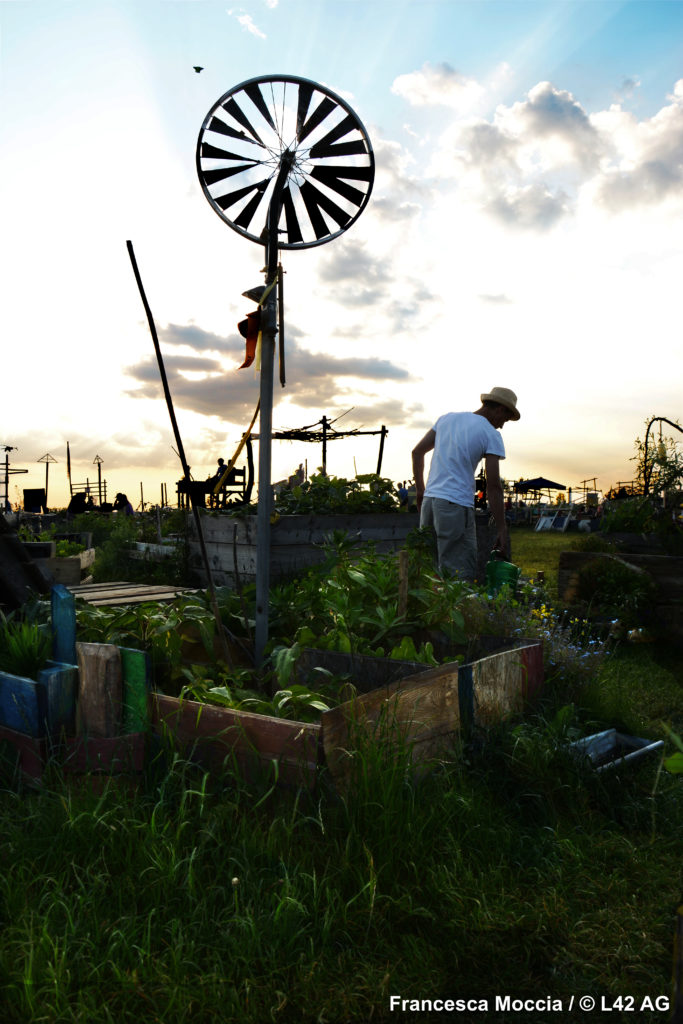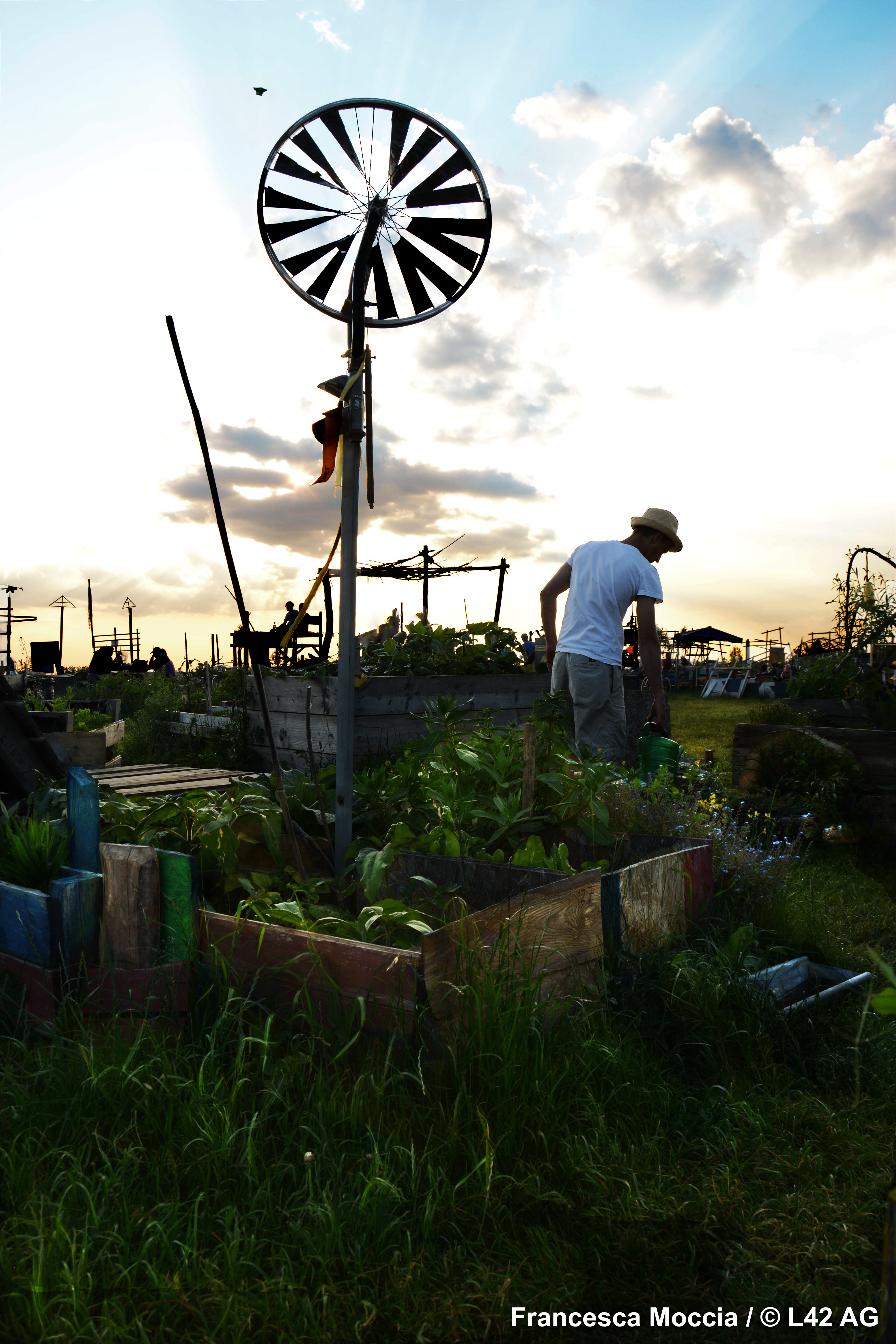
“(Das ist die) Berliner Luft” is the name of a famous march from the fantastical burlesque opera Frau Luna, which was set to music in 1904 by Paul Lincke from a text by Heinrich Bolten-Baeckers. The happy refrain is almost as much a part of the history of Berlin as the Brandenburg Gate and is continuously reworked in different ways every time someone wants to underline the proverbial effervescence of the city. The Berliner Philharmoniker even use it, for example, to close the season at the Waldbühne, that famous stage set up, quite literally, in the woods.
The air of Berlin has always been special. Evidently, the gas of the atmosphere in this part of Germany combines in a most peculiar way and is why creatures who still possess a discrete amount of that residual animal instinct known as smell have always been secretly attracted to its spaces and places. Here you find something that arrives directly to the sense and to the primitive zones of the brain while seemingly bypassing those centers of rational reprocessing. The olfactory receptors notoriously send, in fact, signals from parts of the area of the cerebral cortex known as the limbic lobe, which is the seat of the emotions and memories and even primordial instincts. A smell is capable of being directly responsible for the flowering of a memory or an emotion connected to it or to cause a person to make instinctive decisions as regards their existence without a second thought, as it were.
Many believe that what Berlin lacks in rationality it more than makes up for with its opposite and this is precisely what’s commented on to an almost infinite degree: garrulous expressions of unanimous and homogenous joy among those of a so-called “alternative” mindset oscillating with the similarly cohesive banging of more “traditional” minds against the metaphorical wall. In Berlin both air and ideas circulate at a rather lively tempo. For here we are completely exposed to the winds thanks to an absence of natural protective barriers. There’s not even a mountain range to help stagnate the atmosphere even one little bit. We are thus condemned to constant flux: clouds, rain, wind, and sun continuously run one after the other and the air settles and unsettles itself ceaselessly.
The air of Berlin has changed multiple times throughout history, but that which shall concern us here is the air of contemporary Berlin. The adjective “contemporary” in relation to Berlin may come across as a bit stale. The city deserves a more dynamic one, it’s true, but while it’s chomping at the proverbial bit, language, as always, plods on along behind. We shall yield to such inevitable temporal confusion and tell the tale of today, fully aware of the fact that, at the moment of reading, today will have already become yesterday. All the same, ours must do its best to be the “freshest” of guides.
And when it’s fresh you want, what’s better than a market? And so to a market we went, full of enthusiasm…we learned a lot, and we asked every single seller the same dull question: “You’ll be here again next time, right?” And every single one of them, even those who’ve always been there, answered in a Sybil-like manner, appropriately, really, and with a fine Berliner accent “Who knows?” Indeed. Who knows? And this could be the key to interpreting the entire city. Who knows? It’s flawless.
This here before you, dear reader, is to be an olfactory guide and, like everything in life, aside from its being imperfect, it will also be erratic. It is a subjective guide and one that has every intention of stimulating subjectivity. It exalts the primitive olfactory sense as a precious instrument of emotional and intuitive awareness.
The human nose is said to possess 350 receptors which permit it to recognize up to 15,000 odors, which, however, have not yet been catalogued with precise names. For years now a brilliant Scandinavian scientist by the name of Sissel Tolaas has concerned himself with the smells of Berlin – without distinguishing between pleasant and unpleasant – and with recreating them in his laboratory. One of his ambitious objectives is that of giving each of them a name in order to be able to talk about them in a universal and precise way. No easy task.
Our journey through the fragrances of Berlin will begin at Winterfeldtplatz, in the neighborhood of Schöneberg, on a Saturday morning when the weekly market is full swing. The Winterfeldtplatz market is famous throughout the city for its variety and thus, for us, it will prove to be a good exercise in the refinement of our olfaction before dedicating ourselves to the exploration of more complex areas of the city, olfactorily speaking.
From the market we will continue on sniffing out the West: we will go to Wittenbergplatz and visit the famous KaDeWe – that huge collection of the most varied international perfumes and symbol of a luxurious Berlin where everything, or almost everything, is possible for price – and then compare it to the world of Harry Lehmann’s perfumery in the Kantstraße where natural essences are sold by weight and combined in whichever way is most pleasant to you and your nose. Thereafter, we shall take in the smells of Grunewald with its woods, its lake, and railways and then, with our lungs well oxygenated, we shall finish with lunch in a smoky pub, elbow to elbow with the people. Our next stop will be Kreuzberg, the traditional working-class district which, thanks to gentrification, has continuously been moving more towards Neukölln in order to offer up their own “olfactory resistance.” With our by that point highly refined noses, we shall move on to Mitte in order to verify that the air there is truly other. Mitte has been making itself beautiful, you see, for more than twenty years now. And yet, unhappy with the superficial results, it has been undergoing aesthetic treatments of an ever-crueler cast. It has given itself up to invasive surgery, allowing excavations of all of its parts, tar ointments, and forced drafts with the hopes of being able to show up at the ball purer than Cinderella. A Cinderella for whom, however, one ball is not enough. And so the excavations, powders, pomades begin yet again at another part…well, you get the picture: in short, a Cinderella who’s a bit hysterical. The more the city cleans itself up, however, the more its various, and highly individual, smells disappear. Even ones we didn’t particularly like suddenly fill us with a heart-wrenching nostalgia…and so, we’ll try to go sniffing after them, hoping to at least fix them in a memory. Who knows, maybe one day we will be able to place them safely in a New Berlin we shall construct a bit further on down the road. From Mitte proper we’ll proceed to Alexanderplatz, which technically is a part of Mitte, but is also a borderland. It allows itself to be crossed by every essence imaginable, but remains indifferent to every single one of them. Finally, we will move out toward the outskirts of the city, to the Olympia Stadium and there we will meet the penetrating odor of beer in all its forms and stages of dispersal when there’s a soccer match or the stench of engines from the driving school, or the triumphant, bitter smell emanating from the smokestacks in the adjacent industrial zone on a day when the stadium is silent. And it’s here, close to the smokestacks, that at the end of the summer season the Berliner Philharmoniker together with twenty thousand spectators euphorically sing “Das ist die Berliner Luft!”
If we wanted to follow the least bit of scientific rigor we’d naturally have to move around the city blindfolded so as to selectively take advantage of our sense of smell. This, however, would create small issues of traffic and public order and our subjectivity and emotions would splinter rather quickly before the face of a kindly police officer. We shall have to content ourselves, therefore, with simply suggesting that our sense of smell will help the other senses at our disposal in the discovery of Berlin, and it will offer us the immediate and emotional comprehension of this incredible city and, last but not least, through that, perhaps even a bit more of ourselves.
Translated by Alexander Booth

